| |
STORIES, BOOKS & MEDIA

The majority of the following books are from the library of Chon Tri. Many of the summaries and in his own words. If you wish to purchase the book, click on the cover image and you will be linked to Amazon.com.
| Select a Category » |
[
Foundation
]
[
Practice
]
[
Sutra & Sastra
]
[
Koans
]
[
Works
]
[
History & References
]
[
Essays & Studies
]
[
Others
]
» Buy this book
» Recommend a Book
|
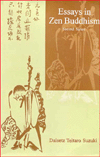
|
11. ESSAYS IN ZEN BUDDHISM: 2ND SERIES
by Daisetz Teitaro Suzuki
Publisher: Munshiram Manoharial Publishers Private, Limited (ISBN #: 8121509564, Paperback, 367 pp, January 2000)
» Submit a review
Summary
This is the 2nd series of the set of 3 volumes.
|
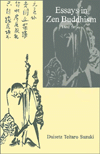
|
12. ESSAYS IN ZEN BUDDHISM: 3RD SERIES
by Daisetz Teitaro Suzuki
Publisher: Munshiram Manoharial Publishers Private, Limited (ISBN #: 8121509572, Paperback, 396 pp, September 2000)
» Submit a review
Summary
This is the 3rd series of the set of 3 volumes.
|
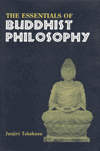
|
13. ESSENTIALS OF BUDDHIST PHILOSOPHY
by Junijiro Takakusu
Publisher: Motilal Banarsidass (ISBN #: 8120804295, Hardcover, 235 pp, January 1998)
» Submit a review
Summary
In Japan the whole of Buddhism became the living and active faith of the mass of the people. The present study related to Japanese Buddhism, as in Japan alone the whole of Buddhism has been preserved. Divided into fifteen chapters, the book deals with different schools of Buddhist Philosophy. The author has grouped these schools under two heads: (1) the schools of Negative Rationalism, i.e. the Religion of Dialectic Investigation, and (2) the schools of Introspective Intutitionism, i.e. the Religion of Meditative Experience.
|
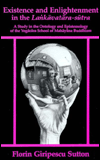
|
14. EXISTENCE AND ENLIGHTENMENT IN THE LANKAVATARA-SUTRA: A STUDY IN THE ONTOLOGY AND THE EPISTEMOLOGY OF THE YOGACARA SCHOOL OF MAHAYANA BUDDHISM
by Florin Giripescu Sutton
Publisher: State University of New York Press (ISBN #: 0791401723, Hardcover, 371 pp, December 1990)
» Submit a review
Summary
From The Critics
A systematic analysis of important concepts characteristic of the Yogacara school of Buddhism as expressed in an influential text from the late 4th century A.D. Outlines the three-fold nature of being as conceptualized in Buddhist metaphysics, explores the Buddhist approach to knowledge in its religious sense, and argues that Buddhists used dialectical reasoning to transcend the dualities of common perceiving and thinking. (booknews.com)
|
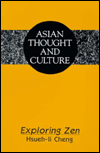
|
15. EXPLORING ZEN
by Hsueh-li Cheng
Publisher: Peter Lang Publishing, Incorporated (ISBN #: 0820436534, Paperback, 236 pp, October 1996)
» Submit a review
Summary
This book is a philosophical and comparative exposition of Zen. It brings out the values in Zen that are similar to Western philosophy. It also discusses how Zen's perception of truth, spiritual language, and religious communication resembles neo-orthodox Christianity. Zen's approach to education has roots in Confucianism. The liberation which Zen Buddhists seek cannot be explained by a metaphisical system. Yet this book repudiates the view that Zen is illogical or amoral. The inner logic of Zen is explored, and also the ways in which Zen Buddhism is a highly moral practice. (From the back cover of the book.)
|
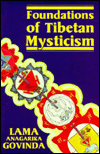
|
16. FOUNDATIONS OF TIBETAN MYSTICISM
by Lama Anagarika Govinda
Publisher: Red Wheel/Weiser (ISBN #: 0877280649, Paperback, 311 pp, June 1972)
» Submit a review
Summary
A thorough presentation of Tibetan esoteric principles, "Foudations of Tibetan Mysticism" is one of the most valuable books ever written on the subject. Lama Anagarika Govinda spent ovee 20 years of his life as a member of Kargyutpa Order. Studying st the feet of masters in Tibetan hermitages and monasteries, his direct experience has given him a clear insight into much that has remained totally obscure to the world. This work, regarded as a classic of Tibetan mysticism, explains the esoteric principles of Mantras and clarifies the differences between Hindu and Tibetan yoga, and is our direct link to the spiritual achievements of the past and their relationship to a futire higher civilization of humanity. (From the back cover of the book.)
|
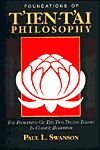
|
17. FOUNDATIONS OF T'IEN-T'AI PHILOSOPHY: THE FLOWERING OF THE TWO TRUTHS THEORY IN CHINESE BUDDHISM
by Grand master Chih-I; Paul L. Swanson (translator)
Publisher: Asian Humanities Press (ISBN #: 0895819198, Paperback, 399 pp, June 1989)
» Submit a review
Summary
From the Publisher
A chronological account of the development of the Two-Truth theory which forms the foundation of T'ien T'ai philosophy, the teaching of the Threefold Truth, and includes an annotated translation of Chih-i's Fa hua hsuan i.
|
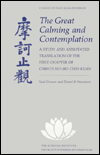
|
18. GREAT CALMING AND CONTEMPLATION: A STUDY AND ANNOTATED TRANSLATION OF THE FIRST CHAPTER OF CHIH-I'S MO-HO CHIH-KUAN
by Grand master Chih-I; Neal Donner & Daniel B. Stevenson (translators)
Publisher: University of Hawaii Press (ISBN #: 0824815149, Hardcover, 385 pp, March 1995)
» Submit a review
Summary
From the Publisher
Chih-i (538-597) was the principal founder of the T'ien-t'ai (Tendai) school, one of the most influential and enduring traditions of East Asian Buddhism. In the Mo-ho chih-kuan (Great calming, contemplation), an extraordinarily comprehensive treatise on the theory and practice of meditation, the revered master sets forth the "perfect and sudden" approach to Buddhahood, a distinctively East Asian conception of the Buddhist path regarded by Chih-i and his contemporaries as the epitome of the Buddha's teaching. In many ways Chih-i's systematization of Chinese Buddhist meditation practice led the way to the development of Ch'an (Zen) and Pure Land. Such an illustrious history and catholicity of appeal secure it a place alongside Buddhagosa's Visuddhimagga and Tsong-kha-pa's Lam-rim chen-mo as one of the great classics of Buddhist spirituality. The original text of the Mo-ho chih-kuan consists of ten main chapters distributed over ten fascicles - the equivalent of four or five volumes in English. The translation of the first chapter is offered here together with the influential preface composed by Chih-i's disciple Kuan-ting (561-632), the man responsible for recording and editing the work. Known as the Synopsis, this chapter rehearses in condensed form the basic structure and thematic content of the Mo-ho chih-kuan as a whole. Because of the self-contained character of this chapter, T'ien-t'ai exegetes have treated it almost as a work unto itself; it contains an important and influential exposition of the Four Forms of Samadhi (not contained in the body of the text). The annotation provided in this volume draws from the authoritative commentary by Chan-jan (711-782). Scholars of Buddhism, most especially the T'ien-t'ai tradition, will appreciate the availability in English of this important work.
|
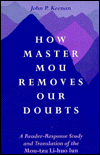
|
19. HOW MASTER MOU REMOVES OUR DOUBTS: A READER-RESPONSE STUDY AND TRANSLATION OF THE MOU-TZU LI-HUO LUN
by Master Mou; John P. Keenan (translator)
Publisher: State University of New York Press (ISBN #: 0791422046, Paperback, 229 pp, September 1994)
» Submit a review
Summary
From the Publisher
This is the first English translation of the earliest Chinese Buddhist text, but it is more than a translation. Keenan shows that Mou-tzu's Treatise On Alleviating Doubt is a Buddhist hermeneutic on the Chinese classics.
|
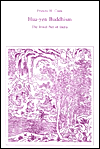
|
20. HUA-YEN BUDDHISM: THE JEWEL NET OF INDRA
by Francis H. Cook
Publisher: Pennsylvania State University Press (ISBN #: 027102190X, Paperback, 164 pp, January 1977)
» Submit a review
Summary
Reviewer: Bryan W. Van Norden from Poughkeepsie, NY USA.
This book is an excellent introduction to Hua-yen Buddhistm (known as Kegon in Japan), a very important kind of Mahayana Buddhism, which has strongly influenced Ch'an (i.e., Zen) Buddhism. The basic teaching of Hua-yen is that "all is one and one is all." Cook explains what this means and how this form of Buddhism evolved.
|
|
|

SUPPORT ZENGUIDE.COM

Purchase posters, art prints, media (music CD & DVD)
 ZEN SETTING I
ZEN SETTING I
by Packard
→Puchase this Item
→More Art Prints & Media
→Zen & Buddhism books
|
|
|
s
.
t
.
o
.
r
.
i
.
e
.
s
.
,
.
.
b
.
o
.
o
.
k
.
s
.
.
&
.
.
m
.
e
.
d
.
i
.
a
.
|















 ZEN SETTING I
ZEN SETTING I









